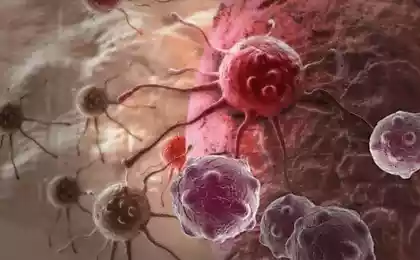156
WHO adds meat to list of cancer-causing carcinogens
The World Health Organization (WHO), after examining data on the effects of meat consumption on human health, concluded that meat and meat products are carcinogenic and can lead to the development of cancer.
On October 26, 2015, 22 experts from 10 countries presented the results of a study of 800 scientific papers conducted over the past 20 years, proving the link between meat consumption and the development of various types of cancer in humans.
Meat can now be found on the official WHO list of carcinogens by searching for “meat.”

Processed meat is given the status of a carcinogen group 1. It is scientifically proven that it leads to the development of cancer. In particular, every 50 grams of processed meat consumed daily increases the risk of colorectal cancer by 18%. The same group of carcinogenicity includes tobacco, formaldehyde, asbestos and diesel engine exhaust. Processed meat includes salted, smoked and other meat that has been processed to improve taste or storage duration, for example, ham, canned meat, sausages.
Red meat has been given the status of a group 2A carcinogen. In this group, doctors included the meat of all mammals, including the meat of cows, calves, goats, pigs, sheep, horses.
In particular, the experts noted that daily consumption of this meat “possibly carcinogenic” and “may increase the chances of developing rectal cancer, prostate cancer and pancreatic cancer.”
Why the WHO is so reluctant to recognize the harm of meat and many influential doctors continue to hide the facts of the harmful effects of animal products on the human body, explains well Dr. Colin Campbell, Professor Emeritus of the Department of Food Biochemistry at Cornell University, more than 50 years in the field of nutrition, proved the relationship between disease and animal food, the author of more than 300 scientific papers and two bestsellers:
“Why doesn’t medicine take nutrition seriously?” The answer to this question can be four words: money, conceit, power and control. When nutrition education happens in connection with public health issues, guess who provides educational materials for these purposes? The Dannon Institute, the Egg Nutrition Board, the National Livestock Association, the National Dairy Council, Nestle Clinical Nutrition, Wyeth-Ayerst Laboratories and other organizations have joined forces to create the Nutrition in Medicine and the Nutrition Medical Curriculum Initiative.
Do you think this star-studded team of animal and pharmaceutical manufacturers will make objective judgments and suggest optimal nutrition schemes in an environment where scientific evidence suggests that the healthiest diet is one based on whole plant foods, minimizing the need for drugs? ?
His book “China Study” has been translated into 10 languages and sold more than 1 million copies. The book is based on the unprecedented scale of the 20-year project “China-Cornell-Oxford” (China-Cornell-Oxford Project), launched in 1983 and conducted jointly by the Chinese Academy of Preventive Medicine, Cornell and Oxford universities (USA and UK respectively).
The study identified more than 8,000 statistically significant relationships between dietary factors and diseases such as cancer, stroke, heart attack, atherosclerosis and other cardiovascular diseases, obesity, diabetes, autoimmune diseases, osteoporosis, Alzheimer’s disease, kidney stones and vision loss.
The study, which covered 880 million (96%) local residents, began by examining the death rate from 12 different cancers in more than 2,400 counties in China. It was carried out by 650,000 employees and the end result was an atlas showing where the incidence of a particular type of cancer was high and in which the disease was almost non-existent. published
P.S. And remember, just by changing our consumption, we change the world together! © Join us on Facebook , VKontakte, Odnoklassniki
Source: veganstvo.info/518-voz-dobavila-myaso-v-spisok-kancerogenov-vyzyvayuschih-rak.html
On October 26, 2015, 22 experts from 10 countries presented the results of a study of 800 scientific papers conducted over the past 20 years, proving the link between meat consumption and the development of various types of cancer in humans.
Meat can now be found on the official WHO list of carcinogens by searching for “meat.”

Processed meat is given the status of a carcinogen group 1. It is scientifically proven that it leads to the development of cancer. In particular, every 50 grams of processed meat consumed daily increases the risk of colorectal cancer by 18%. The same group of carcinogenicity includes tobacco, formaldehyde, asbestos and diesel engine exhaust. Processed meat includes salted, smoked and other meat that has been processed to improve taste or storage duration, for example, ham, canned meat, sausages.
Red meat has been given the status of a group 2A carcinogen. In this group, doctors included the meat of all mammals, including the meat of cows, calves, goats, pigs, sheep, horses.
In particular, the experts noted that daily consumption of this meat “possibly carcinogenic” and “may increase the chances of developing rectal cancer, prostate cancer and pancreatic cancer.”
Why the WHO is so reluctant to recognize the harm of meat and many influential doctors continue to hide the facts of the harmful effects of animal products on the human body, explains well Dr. Colin Campbell, Professor Emeritus of the Department of Food Biochemistry at Cornell University, more than 50 years in the field of nutrition, proved the relationship between disease and animal food, the author of more than 300 scientific papers and two bestsellers:
“Why doesn’t medicine take nutrition seriously?” The answer to this question can be four words: money, conceit, power and control. When nutrition education happens in connection with public health issues, guess who provides educational materials for these purposes? The Dannon Institute, the Egg Nutrition Board, the National Livestock Association, the National Dairy Council, Nestle Clinical Nutrition, Wyeth-Ayerst Laboratories and other organizations have joined forces to create the Nutrition in Medicine and the Nutrition Medical Curriculum Initiative.
Do you think this star-studded team of animal and pharmaceutical manufacturers will make objective judgments and suggest optimal nutrition schemes in an environment where scientific evidence suggests that the healthiest diet is one based on whole plant foods, minimizing the need for drugs? ?
His book “China Study” has been translated into 10 languages and sold more than 1 million copies. The book is based on the unprecedented scale of the 20-year project “China-Cornell-Oxford” (China-Cornell-Oxford Project), launched in 1983 and conducted jointly by the Chinese Academy of Preventive Medicine, Cornell and Oxford universities (USA and UK respectively).
The study identified more than 8,000 statistically significant relationships between dietary factors and diseases such as cancer, stroke, heart attack, atherosclerosis and other cardiovascular diseases, obesity, diabetes, autoimmune diseases, osteoporosis, Alzheimer’s disease, kidney stones and vision loss.
The study, which covered 880 million (96%) local residents, began by examining the death rate from 12 different cancers in more than 2,400 counties in China. It was carried out by 650,000 employees and the end result was an atlas showing where the incidence of a particular type of cancer was high and in which the disease was almost non-existent. published
P.S. And remember, just by changing our consumption, we change the world together! © Join us on Facebook , VKontakte, Odnoklassniki
Source: veganstvo.info/518-voz-dobavila-myaso-v-spisok-kancerogenov-vyzyvayuschih-rak.html
Everything you need for a comfortable life in the apartment of 50m2
Why posture correctors are rarely helpful























